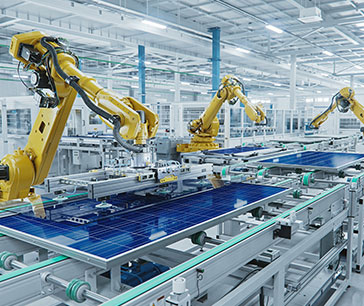Table Of Contents
- Green Chemistry: An Eco-Friendly Alternative for a Sustainable Economy
- Innovative Materials: A Cost-Effective Yet Efficient Solution
- Advanced Manufacturing: Using Cutting-Edge Technology for Precision
- Blockchain: A Step Towards Robust Supply Chain Management
- Nanotechnology: An Effective Way to Enhance Product Performance
- Start of a New Growth Chapter for the Materials and Chemicals Industry

Yerukola Eswara Prasad

Pooja Parvatkar
Top 5 Materials and Chemicals Trends for Q1 2024: Leveraging the Potential of Upcoming Opportunities

The materials and chemicals industry has been one of the crucial sectors in the economy. Any changes in the global economy affect the functioning of this industry. For instance, the spirit of innovation that has been a characteristic feature of the 21st century has entered this industry also; it has led to advancements in materials and chemicals manufacturing. The adoption of innovative technologies such as blockchain and nanotechnology is also a proof of the winds of change flowing in this industry. To offer a firm understanding of this shift in the industry, Allied Market Research has analyzed the 5 major trends in the materials and chemicals sector. These trends are expected to act as the pillars of the industry in the coming period.
Green Chemistry: An Eco-Friendly Alternative for a Sustainable Economy
Green chemistry basically refers to manufacturing of materials and chemicals with the help of processes that minimize or avoid the use and the generation of hazardous and toxic substances. Due to this foundational principle, green chemistry is also known as sustainable chemistry. Traditionally, the materials and chemicals industry has been one of the most polluting sectors of the economy. The atmospheric pollution caused by this industry has been a concern, leading to growing voices for changing its nature. Green chemistry, which has been a result of this movement, focuses on designing processes that maximize raw material usage. Furthermore, it emphasizes the use of renewable energy sources and benign substances for manufacturing. Energy efficiency and minimal waste generation, thus, form the basis of green chemistry.

Innovative Materials: A Cost-Effective Yet Efficient Solution
Advancements in science and technology have helped leading companies in the materials and chemicals industry to develop and design innovative materials. Due to the use of smart manufacturing tools, these materials have been extremely cost-efficient; at the same time, they have demonstrated high efficiency in delivering the necessary output and achieving the pre-determined targets. The role of Artificial Intelligence and machine learning has been crucial in the development of such innovative materials. AI has been able to unlock the potential of computational chemistry to its fullest and develop materials by studying chemicals at their atomic levels. In this arena, synthetic biology has also played a pivotal role by offering help in bioremediation, drug development, and creation of biomaterials.
Advanced Manufacturing: Using Cutting-Edge Technology for Precision
Over the years, the materials and chemicals industry has witnessed a tremendous evolution in the manufacturing processes used for chemical production. The biggest breakthrough in the development of smart manufacturing techniques has been provided by AI and machine learning. The integration of these technologies has helped in faster production of materials, that too, with higher accuracy and precision. These smart manufacturing techniques which employ cutting-edge technologies such as automation and robotics are collectively known as advanced manufacturing. Apart from AI and ML, additive manufacturing methods such as 3D printing have also gained huge popularity. Moreover, the use of multi-scale modelling for predicting the behavior of chemical systems at atomic and sub-atomic levels has enhanced the precision of manufacturing significantly.

Blockchain: A Step Towards Robust Supply Chain Management
To explain it in simple terms, blockchain technology offers a platform to record information and store data in such a way that it can’t be manipulated or hacked. To ensure this, blockchain technology uses a decentralized and immutable ledger system for data storage. One major challenge faced by the materials and chemicals industry is that the supply chains of this industry are sensitive, meaning even a small disturbance could thwart the smooth functioning of the entire system. Blockchain technology can offer a way out of this; it helps stakeholders divide the workload between themselves with clear demarcation of responsibilities. It can help introduce transparency, traceability, and security in supply chains, thus improving the working of the entire industry. The surge in adoption of this technology in chemical manufacturing is anticipated to help the blockchain market to flourish immensely in the coming period.
Nanotechnology: An Effective Way to Enhance Product Performance
Incorporating nanotechnology in the materials and chemicals industry has been one of the most striking trends as it has changed the very basis of how chemicals and materials are manufactured. By helping design materials at the nanoparticle level, this technology has led to enhancement of strength and durability of materials significantly. Moreover, in the case of electrical conductors, nanotechnology has improved the conductivity of the materials and increased the efficiency of electrical systems developed using such materials.

Start of a New Growth Chapter for the Materials and Chemicals Industry
A comprehensive analysis by Allied Market Research points out the five trends that will revolutionize the industry soon. Green chemistry, innovative materials, advanced manufacturing, integration of blockchain technology, and use of nanotechnology are these five trends which are expected to kickstart a new chapter of opportunities and growth in the industry in Q1 2024. Businesses should take a cue from these trends to overcome the challenges they might face in the upcoming year. For more tips and recommendations on how businesses can establish their dominance in the industry, feel free to contact us.

